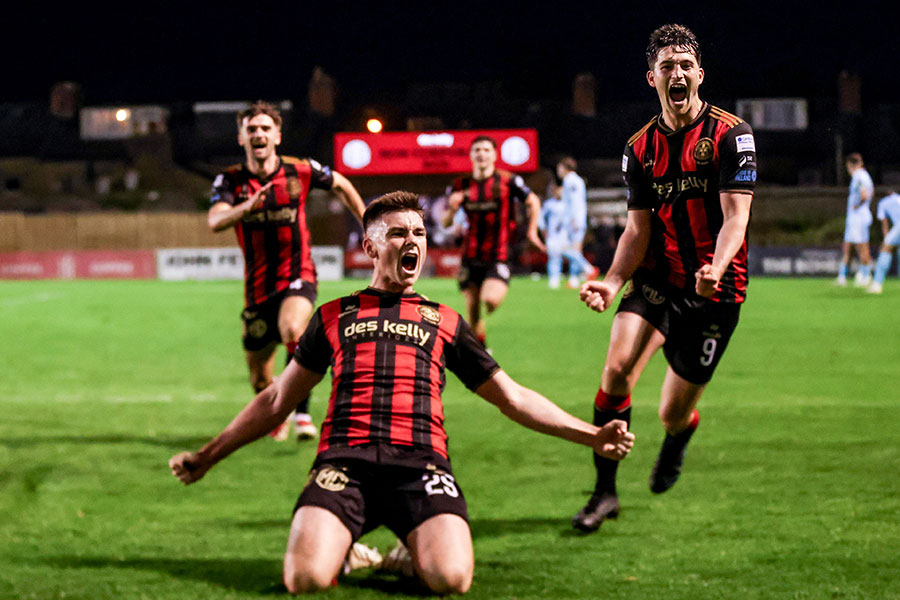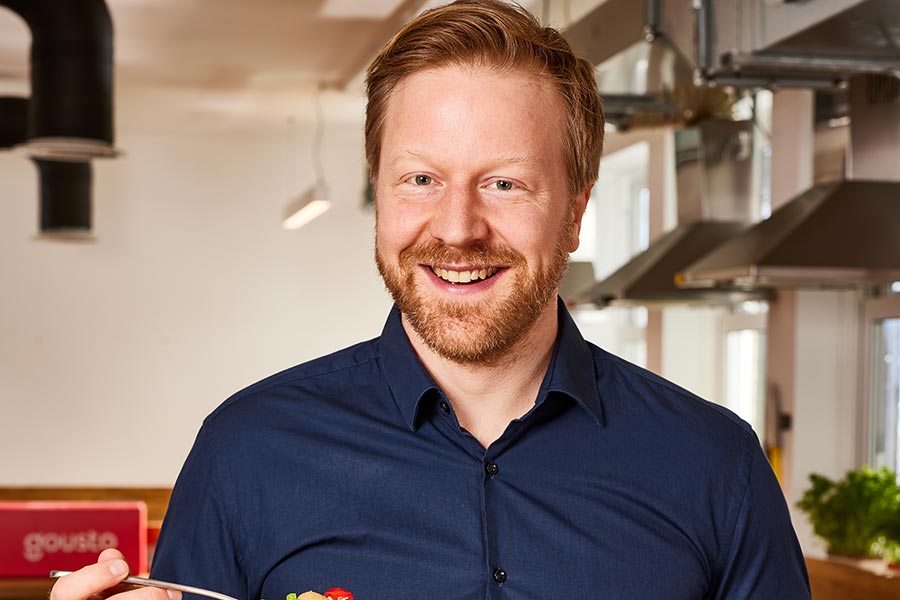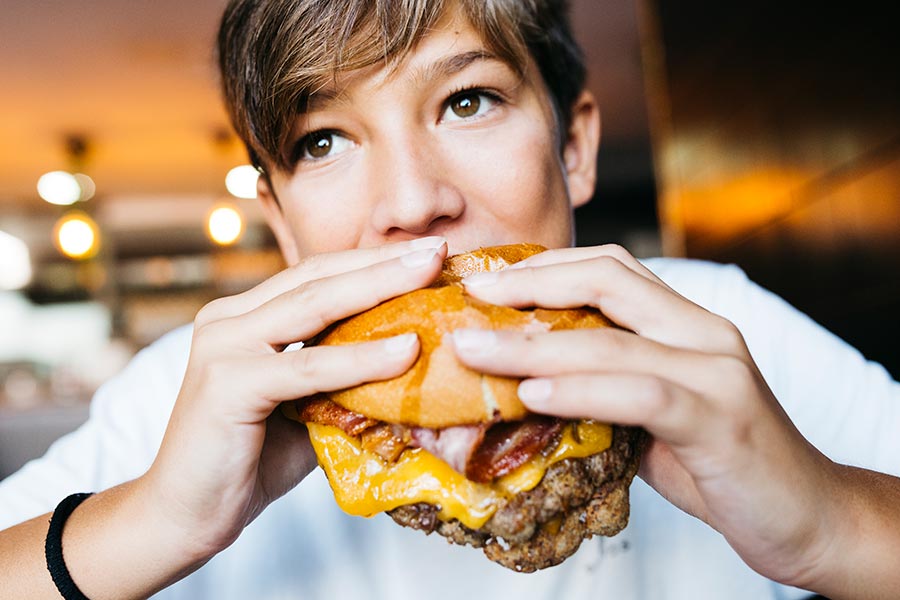From welcoming a new cohort of fans at Dalymount Park to seeing a massive surge in merchandise sales, things are looking up for the northside Dublin football team. Chief operating officer Daniel Lambert talks to Ben Haugh about the club’s fortunes and why its values go beyond the bottom line
Daniel Lambert is drawing shapes with his finger on a large conference table at Bohemian FC’s office.
The north Dublin football club’s chief operations officer is explaining how its merchandise revenue increased by almost 2,000 per cent over the last decade.
The table, he says, is the global football community. It includes heavyweight competitions such as the Premier League in England, La Liga in Spain and the Bundesliga in Germany.
“The League of Ireland [LOI] is over here”, he continues, pointing to the edge of the surface.
“If you design a beautiful football shirt when you exist in this corner, your market is a tiny speck. It doesn’t matter how good-looking it is.
“[But] because the values that Bohs have are universal, we’ve been able to sell shirts all over the world every day.”
The LOI is having a moment.
Attendance across the top two divisions has increased by 126 per cent since 2016. One of the biggest beneficiaries has been Bohemians, with the club welcoming a legion of new fans.
The opening game of the season between Bohemians and Shamrock Rovers was played at the Aviva Stadium and attracted more than 33,000 spectators.
The FAI Cup final between Bohemians and St. Patrick’s Athletic in 2023 was attended by almost 44,000.
In 2014, the club had a turnover of just under €1m, including about €100,000 worth of merchandise sales.
Last year, turnover was €4.5m and almost half of this (€2m) came from merchandise.
“It’s been a long time building that. I would have said to the board about four or five years ago that I could get the merch to a million. And it seemed fanciful at best,” Lambert, 37, says.
When we meet early on a bright spring day, Lambert is wearing a Fred Perry polo shirt and a black trench coat buttoned to the top with a Palestine pin stuck to its collar.
He looks more like the manager of a mod band than the head of a football club.
As it happens, he does manage the Belfast rap outfit Kneecap and his partner is Radie Peat, singer in the folk group Lankum.
Bohemian FC’s offices, located on the first floor of the brutalist Phibsboro Shopping Centre, have a punky aesthetic with mis-matching furniture and walls decorated by memorabilia, signs and posters.
During a quick scan, I spot the latest issue of Revolutionary Communist magazine, a Kneecap scarf, a miniature statue of Lenin’s head and a print showing Bob Marley in heaven sporting a Bohemians jersey with a halo.
It feels like the office of a Berlin based music magazine.
It makes sense then, that Lambert, who has a degree in business studies from DCU, took inspiration from a German club when creating a commercial strategy.
“I admired what St Pauli had done in that space and thought, ‘Could we do something similar?’”
The Hamburg football cooperative is fan-owned. It prioritises community values, sporting authenticity and social responsibility.
St Pauli’s merch, known for its skulls and crossbones, sells all over the globe.
In Bohemians’ case, Lambert says the club has used its community work, charitable donations and history, both sporting and musical, to create a connection with its fanbase.
“The Bohs model is built around the inherent values and history of the club, whether it’s a Bob Marley or a Thin Lizzy gig [both played at Dalymount Park in the late 1970s and early ’80s], or someone [contemporary] like Fontaines D.C.
“Our values piece is Palestine, Refugees Welcome and Focus Ireland.”
All of the above have featured on Bohemians jerseys in recent years, often with a portion of profits going towards charity.
“Bohs feel connected to the community and the community feels connected to Bohs. I think people see we are a force for good,” he says.
Lambert’s plan has been so successful that about two-thirds of Bohemians’ jersey sales are outside Ireland.
“Your home shirt sales are predominantly bought by supporters, and they might fluctuate based on [for example] getting to a cup final.
“Historically, we would have sold 100 away shirts [per season]. Now we sell tens of thousands.
“I’d guess that 95 per cent of people buying our shirts couldn’t name a player, and that doesn’t matter.”
Bohemian FC sells between 20,000 and 30,000 shirts per year.
Lambert wants to double that figure, which would result in income of up to €5m from merchandise.
The club has shipped to 54 countries, he notes, and I ask which are the farthest afield.
Lambert taps away on the keyboard while reading through past orders.
“Saudi Arabia, Bermuda, Vietnam, Mexico…” Lambert believes Bohemians have attracted lifetime football fans who feel “a sense of loss” about how “heavily commercialised” it has become.
Full disclosure: I am one of these new supporters. I grew up watching Liverpool and the English Premier League, but started to become disillusioned when nation states bought up clubs and transfer fees stretched above £100m.
When I bought a house in Stoneybatter in 2018, I started going to my local club: Bohemians.
The influx has not been without its challenges.
Some months ago, I witnessed a heated argument between a northside Dub who had been supporting the club his whole life and a young woman with multicoloured hair who was likely a new recruit.
They were fighting over limited standing room in the packed singing section.
The woman stood her ground and when it came time to sing, she knew all the words.
Other old-school fans eventually came to her aid when the man got overly aggressive, prompting him to leave and find another space.
The stadium, built in 1901, is showing its age. Although it boasts a lively atmosphere and has a certain urban appeal with its decaying terraces and graffiti-plastered walls, a maximum capacity of 4,500 is limiting Bohemians’ ability to capitalise on the surge of interest in the LOI.
In February last year, Dublin City Council (DCC) approved planning permission for its redevelopment.
The new stadium will have a capacity of just over 8,000, but Bohemians will have to play elsewhere for at least a season during the construction which could begin later this year.
Does Lambert have concerns that Bohemian FC will lose some of its personality?
“Yeah, loads,” he replies immediately. “I don’t think there’s enough acknowledgement of the role that built infrastructure plays in terms of gig venues.
“Kneecap are going to play the 3Arena later this year — it’s a great venue, [but] I don’t like it personally.
“I thought the Point was better.
“A lot of new stadiums just feel a bit soulless, and that’s a huge risk for us. I think it’s safe to say that we’re going to end up working with a major contractor, given the scale of the build and the budget, and you’re probably going to get somebody in who doesn’t give a s**t about anything like that.
“They’re going to want to build something that might as well be a warehouse for Tesco.”
Lambert says street art has been a great way to communicate the club’s values and they will bring that to the new stadium.
“I think you can do a lot post-build. Obviously we’re going to lose the iconic floodlights, but we’re going to try to incorporate the old turnstiles.
“We’re gonna bring as much as we can to it.”
Concerns aside, Lambert knows that a new stadium is necessary to compete with clubs with more financial muscle, such as Shamrock Rovers.
He says ticket prices could be looked at, but any changes will be made carefully and he wouldn’t like to see them go above €30.
“We’re a working-class institution first and foremost and we wouldn’t want to be pricing anybody out, but [the new stadium] would allow for some tiered ticket pricing.
“We know the extra income it would deliver in terms of commercial partners we could potentially work with, LED screens, utilising the stadium for other events in conjunction with DCC.
“In the interim, we are working to continue to grow the merchandise income. We’re hiring a new person with a unique enough role in the next two weeks.
“We’ve a warehouse facility in Glasnevin, we don’t use third-party sellers. We’re confident in that model.”
Can we expect to see Dalymount renamed the Des Kelly Arena or something similar?
“It’s not my decision solely, but I’d personally be against that,” Lambert says.
“To get into things like naming rights of a stadium like Dalymount is counter to the values of the club. For the amount of money you’d get from it, you’d lose more in terms of what your club represents.”
What about the Arnotts Stand, then?
“I’d personally be against that, too,” he says. “The Jodi Stand is named after Jodi Sportswear, but it’s named after them because [former Bohemians player and company owner] Tony O’Connell built the stand.
“The stadium’s been there since 1901. Why should we give a corporate that amount of history?”
This interview takes place two days after Bohemians’ 1-0 loss to Drogheda United, its fourth defeat in a row.
“I’m a fan my whole life, so I’m as down as anybody else,” Lambert says. “[But] the medium- and long-term [future of the] club doesn’t rest on a game or two.
“There are implications, as European qualification is worth a lot of money. A feelgood factor around a club creates momentum and impacts on revenue.
“But for the most part, [a loss] doesn’t make a huge difference [to] what I’m trying to do.”
Bohemian FC finished eighth last year and has not won a major trophy since 2009.
But its form has improved this season and the club were two points off the top at the time of publishing.
“Everyone would accept that last year was a poor season and any of the players, any of the staff will ultimately look at the football side of the club.
“While I have a role in some elements, I’m not directly involved in any of the things that happen on the pitch.

“I work mainly on the club’s finances.”
Despite Bohemians’ lack of recent success, Lambert is bullish about the future.
“When we come into that new stadium, I think we will sell out 8,000 seats every week.
“And if we do, we’ll have a higher average attendance than anyone else in the division.”
The new stadium would allow the club to more than double its ticket income.
Lambert says other clubs would need huge outside investment to compete.
“I could be wrong, but I don’t think many owners are going to be willing to do that. I think we would be in the best financial position in the league by a distance.
“We should be [able] to put out a top three budget every year, and break even or make a profit.”
Photo: Daniel Lambert, Chief Operating Officer at Bohemians FC. 08/04/2025 Photograph: © Fran Veale









